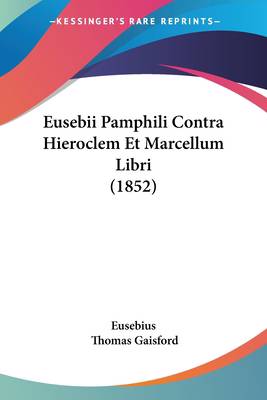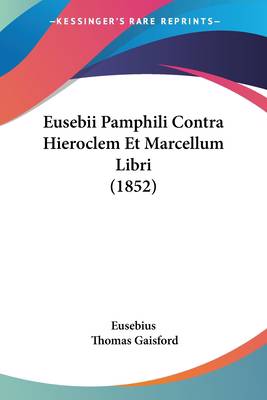
- Afhalen na 1 uur in een winkel met voorraad
- Gratis thuislevering in België vanaf € 30
- Ruim aanbod met 7 miljoen producten
- Afhalen na 1 uur in een winkel met voorraad
- Gratis thuislevering in België vanaf € 30
- Ruim aanbod met 7 miljoen producten
Zoeken
€ 56,95
+ 113 punten
Omschrijving
Eusebii Pamphili Contra Hieroclem Et Marcellum Libri is a book written by Eusebius, a Christian historian and bishop of Caesarea in the 4th century AD. The book is a collection of two treatises, Contra Hieroclem and Contra Marcellum, in which Eusebius refutes the teachings of two heretical leaders of his time.In Contra Hieroclem, Eusebius argues against the teachings of Hierocles, a Roman governor who had converted to Christianity but later became a follower of the philosopher Apollonius of Tyana. Hierocles claimed that Apollonius was a divine figure who performed miracles and had a superior moral character to Jesus Christ. Eusebius refutes these claims and defends the divinity and superiority of Jesus.In Contra Marcellum, Eusebius responds to the teachings of Marcellus of Ancyra, a bishop who denied the doctrine of the Trinity and believed that Jesus was only a man who had been adopted by God. Eusebius argues that Marcellus' teachings are contrary to the teachings of the apostles and the early church fathers, and defends the orthodox doctrine of the Trinity.The book provides valuable insights into the theological debates and controversies of the early Christian church, and Eusebius' arguments continue to be studied and debated by scholars and theologians today.This scarce antiquarian book is a facsimile reprint of the old original and may contain some imperfections such as library marks and notations. Because we believe this work is culturally important, we have made it available as part of our commitment for protecting, preserving, and promoting the world's literature in affordable, high quality, modern editions, that are true to their original work.
Specificaties
Betrokkenen
- Auteur(s):
- Uitgeverij:
Inhoud
- Aantal bladzijden:
- 504
- Taal:
- Engels
Eigenschappen
- Productcode (EAN):
- 9781120618146
- Verschijningsdatum:
- 21/11/2009
- Uitvoering:
- Paperback
- Formaat:
- Trade paperback (VS)
- Afmetingen:
- 152 mm x 229 mm
- Gewicht:
- 666 g

Alleen bij Standaard Boekhandel
+ 113 punten op je klantenkaart van Standaard Boekhandel
Beoordelingen
We publiceren alleen reviews die voldoen aan de voorwaarden voor reviews. Bekijk onze voorwaarden voor reviews.











